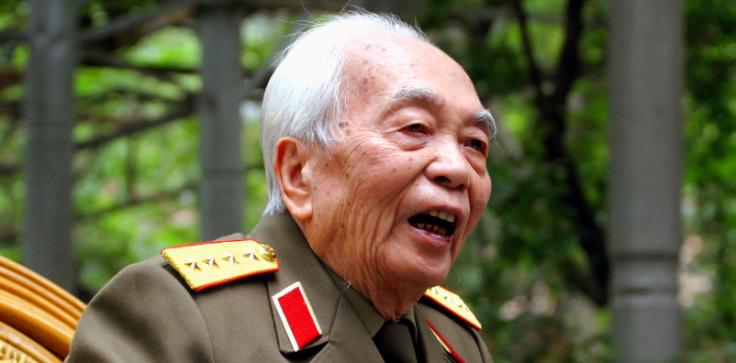Vietnam and General Giap - 'Red Napoleon' or 'Red Terror'?

On 04 October 2013, the man some refer to as Vietnam's "Red Napoleon", Senior General Vo Nguyen Giap, died at the Central Military Hospital in Vietnam's capital, Hanoi, at the age of 102. General Giap's grand state funeral came to a finale on 13 October and definitely marks that oft used phrase "the end of an era", not least because the General managed to outlive his contemporaries in power, civil and military, friend and foe alike.
General Giap beats his former enemies such as Republic of Vietnam Major General (Airforce) Nguyen Cao Ky who died aged 80 in July 2011 and the more talented (Four-Star) General Cao Van Vien who died in 2008 aged 86. Most of Vietnam's top politicians meanwhile are in their 60's.
Old, frail and hospitalized for much of the time in the recent past, General Giap is by no means forgotten, though more recently, increasingly by an older generation. Awkwardly for the authorities, the General has remained in the public eye for his criticisms and open letters censuring the abuses of central and local government or the country's state-run industrial complexes.
General Giap's death however, did most definitely stir memories and trigger a patriotic response that appears to have taken those in charge by surprise. Agence France-Presse (AFP) on 11 October reported during the final preparations for the two-day official mourning period signalled by all flags in the country being lowered to half-mast, that all social and cultural events had been peremptorily cancelled, tourist sights closed and TV programmes rescheduled to show documentaries about the life and times of the General, or the playing of patriotic music.
Last Saturday, General Giap's body lay in state in Hanoi and on Sunday, after a ceremony with full military honours and attended by Vietnam's leaders, tens of thousands lined the streets of the capital and the road to the airport. The coffin, draped with the national flag was enclosed in a glass canopy and carried on a gun carriage for the 25-mile journey. All very stage-managed, it was then flown to the General's birthplace of Mui Rong, Quang Binh Province for burial, in accordance with his wishes and those of his family.
Vietnam's one-party state Communist Government did its best to be seen as being the successors of General Giap and the patriotism he still symbolises, yet AFP described a general outpouring of grief by people of all ages for this old man who lost any effective power before the great majority of them were born.
Jonathan Head, South East Asia Correspondent for BBC News reported that the funeral was used as an indirect way of "lashing out" at the Government:
"...the most incendiary grievances felt against today's Communist leaders...that they have allowed corruption and self-enrichment to get out of hand...(whilst in death, General Giap)...is being seen as a symbol of everything that (they) are not: charismatic, heroic, clean-living, a true patriot."
It is widely recognised that the General was increasingly marginalised after the death in 1969 of Ho Chi Minh - though I think this was happening to both men nearly a decade earlier - and he was finally dismissed from the Politburo in 1982.
Maybe many were reflecting on a "golden age" that never really existed but nonetheless, an estimated hundred thousand made the effort to pay their respects prior to the final funeral period, leaving flowers and incense at General Giap's French colonial villa near the centre of Hanoi. One official funeral organiser, Lieutenant-Colonel Le Van Hai, told the media with genuine surprise:
"We thought people would turn up but we could never have imagined there would be this many. Even when visiting hours are over, people still don't want to leave."
It is quite understandable that Communist supporters, War veterans and people of fifty years and older might want to show their respects yet the crowds spanning all generations when nearly half the population of 92.5 million is under 25 years of age? A tribute that explains the esteem in which General Giap is held was one reported by AFP quoting historian Phan Huy Le:
"The younger generation see him not just as a military hero but a symbol of everything that is right about the Vietnamese nation. They found him a figure they could trust."
They must have read his tirades, even well into his 90s, railing against corruption by the authorities, their economic mismanagement and lifestyles far removed from even the urban middle classes, let alone the millions of desperately poor still in the countryside and the powerless.
One such example was reported in June 2009 by Hong Kong's Asia Times and concerned tea and coffee plantations bulldozed for bauxite projects in two Central Highland provinces. The projects were set up by state-run Vinacomin and a Chinese company which was expected to earn for the Vietnamese government between $150 million and $200 million annually. General Giap's letter read:
"In terms of national interests and sustainable and long-term development, bauxite exploitation will generate critical environmental, social and security effects."
In a previous letter to the country's Prime Minister, he warned that he had personally overseen a study on the issue with soviet experts who had also warned of the serious environmental consequences at the proposed sites.
These issues of course, are not the reason the world recognises General Vo Nguyen Giap, but for his defeat of the French at Dien Bien Phu in 1954. This startling victory, claimed to be the first time a native army defeated their colonial rulers, was not done without outside help - though the Vietnamese keep that bit quiet.
In October 1953, the Chinese got hold of a copy of the Navarre Plan (named after the French Commander, General Henri Navarre. Qouting Jung Chang's Mao, The Unknown Story (2005):
"China's chief military adviser to Vietnam, General Wei Guo-qing, carried this from Peking and delivered it to Ho Chi Minh in person. It was this vital intelligence coup that led to the decision...to give battle at Dien Bien Phu, a French base in north-west Vietnam, where the Vietnamese, with massive Chinese military aid and advice, won a decisive victory in May 1954."
As battles go, a relatively small affair but one that inspired anti-colonial campaigns in much of the world and in particular, soon after had a most significant influence on the National Liberation movement in Algeria. Regrettably, the Algerians also copied General Giap's and the Viet Minh's policy of inflicting a campaign of terror against any who opposed them.
Unlike Napoleon whose armies fought other armies, General Giap and his successors would take an explicitly evil form of guerrilla warfare into the civilian heart of not simply their known opponents but into any area they did not control, in order to impress upon the people that the civil authorities were incapable of protecting them and giving them basic security. The planting of bombs in crowded areas became a common feature, or gangs of men entering neighbourhoods in the dead of night and slitting the throats of sleeping men, women and children.
At a Party conference in 1956, General Giap told delegates that in carrying out their "anti-feudal task":
"...we indiscriminately attacked all families owning land. Many thousands were executed. We saw enemies everywhere and resorted to widespread violence and terror...There were grave errors..."
General Giap would on many other occasions make further, very similar statements - "We executed too many honest people...", "...We resorted to terror, disciplinary punishments and torture..."
Yet these continued on and on and even after the fall of Saigon and the "peace" in 1975, once the world's media had left for other stories, the Government's revenge squads may have executed up to 200,000, forced the eviction of over a million South Vietnamese to the North as prisoners, and indirectly killed untold numbers of others through deliberate exposure to disease and malnutrition.
Possibly in expressing the criticisms he made, General Giap undermined his own authority within a Communist hierarchy much more ruthless than either he or his mentor, Ho Chi Minh. Despite outward appearances, there were those in the Party who had the true measure of both these men - they were and had always been nationalists (that is against the French and for an independent Vietnam) but Communists?
Le Duan (1907 - 1986), with the backing of Le Doc Tho and against the wishes of Ho Chi Minh, ousted General Giap from the position of First Secretary/General Secretary of the Vietnamese Communist Party in 1959 and by the early 60s was the real power, having caught Ho Chi Minh in secret talks over a "neutralist" settlement with South Vietnam officials on more than one occasion.
The Tet Offensive in 1968 was also his, with General Giap forced to play a secondary role after nearly all his staff had been arrested. Considered initially a disaster which had caused over 47,000 North Vietnamese dead and tens of thousands wounded - roughly four to five times those of South Vietnam, America and their Allies - it took the North some months to appreciate that they had actually scored a victory in the living rooms of the United States. And the rest, as they say, is history.
Le Duan dominated the Party from about 1969 until shortly before his death and by the late 70s and early 80s enacted policies which included placing all ethnic Chinese into forced labour or banishment - the preferred option - usually by sea.
The ethnic Chinese included anyone with a Chinese relative or spouse (if unwilling to divorce, the person was classified as "Chinese"). The Vietnam Boat People tragedy which cost the lives of at least 200,000 and probably 400,000 drowned at sea, enriched the coffers of the Government of Vietnam as typically, its officials collected 10 taels of gold (about $3,000 at that time) from every adult and needless to say, all their belongings.
Can General Giap be held responsible for such later actions? Not directly, but having given a green light to so much earlier cruelty and terror, extremism recognised no bounds.
© Copyright IBTimes 2025. All rights reserved.





















